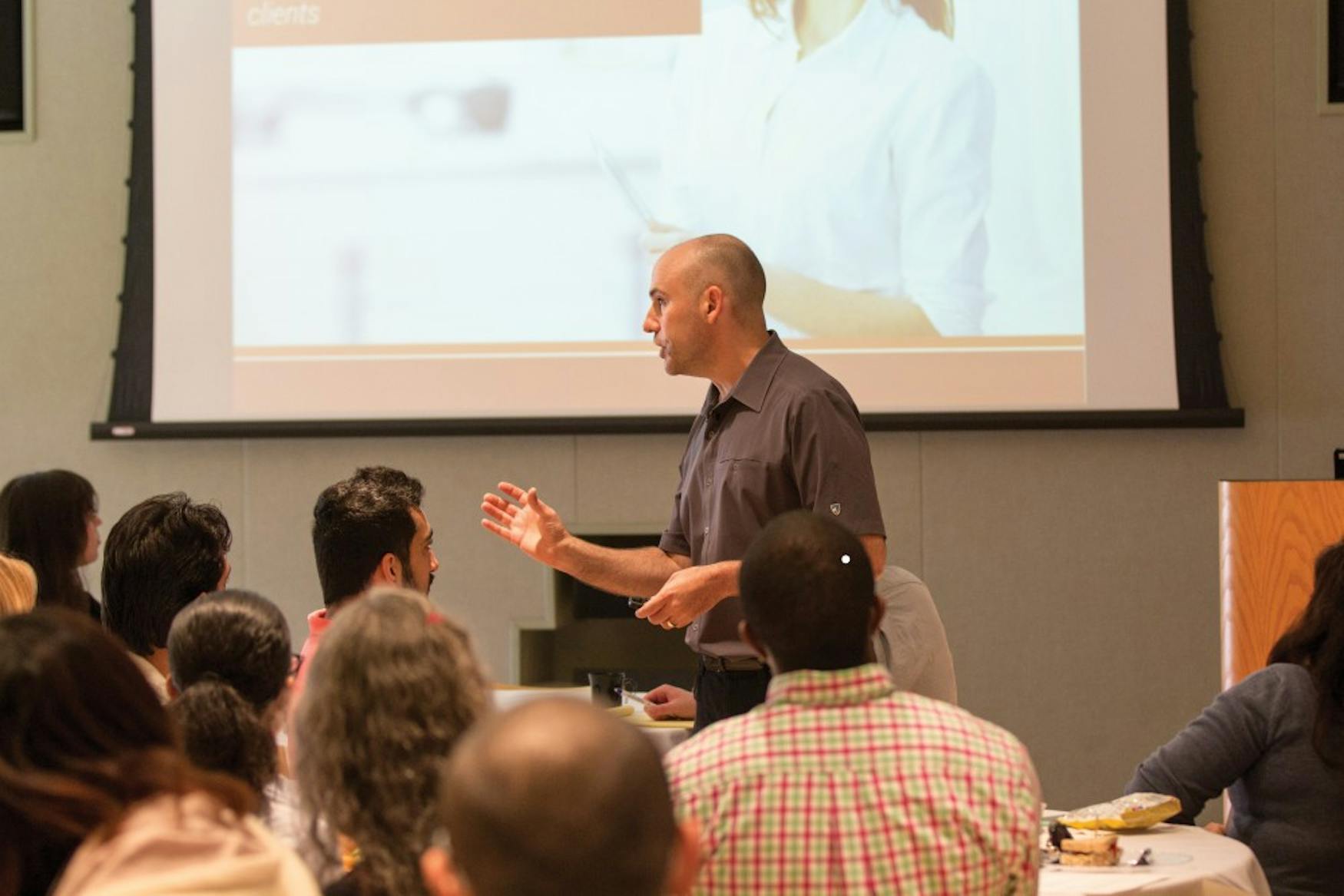Dialogues encourage students to step out of workplace comfort zone
How can you succeed after college? A student-born initiative offered an answer to the question on many students’ minds at Wednesday’s “Your Comfort Zone + Your Workplace.”
Some 30 interested onlookers gathered at the Shapiro Campus Center to inaugurate the University’s annual 2017 to 2018 Dialogues program.
This initiative, which began three years ago in order to provide a direct means of engaging with students, aims to encourage interactive discussions around how to empower oneself in a workplace setting through self-advocacy in stressful situations.
Yet its organizers hope not merely to deal with these pressing issues in the abstract. Through conversations about identity, background and personal challenges they intend for the students themselves to apply what The Dialogues taught them in their daily lives, said Caroline O’Shea, assistant director of employee relations at the Hiatt Career Center.
O’Shea, one of the event’s primary organizers, told attendees that she wanted them to leave with some sort of soft-skill to help them in their professional lives, “especially … when they’re out of school and in the workplace.”
O’Shea’s colleague and fellow Dialogues facilitator, Assistant Director of Experiential Learning and Teaching Alyssa Canelli, emphasized the importance of recognizing an individual’s background and the obstacles they may encounter because of it.
“When you really think about workplace and identity, you know there may be situations in which certain people bear responsibility for stepping outside of their comfort zone more than others,” she said.
Canelli urged participants to consider their own experiences in dealing with stress and taking initiative and to share how they “stepped outside of their comfort zone.”
Prof. Andrew Molinsky (IBS), author of “REACH” — a book designed to provide strategies for developing assertiveness in everyday circumstances — headlined the event.
Molinsky related his own challenges with stress and discomfort in public. “My whole life I’ve always really struggled with stepping outside my comfort zone. When I was in your shoes ... I was in the back of the class,” he said. “I would not say anything. … I was awkward, I was embarrassed,” he confided inthe audience.
Using examples as disparate as Gandhi and Natalie Portman, Molinsky demonstrated the ubiquity of social fear before introducing his research into the topic. Inspired by his own experiences, he investigated common misconceptions related to leaving one’s comfort zone.
Molinsky refuted the prevalent self-help trope that everyone can effortlessly take risks in social settings. He argued instead that such an emotional leap requires far more introspection.
Through scrutiny of a wide gamut of professions, ranging from entrepreneurs to police officers, Molinsky explained that there were “three questions here that I was interested in, which I think are questions that anyone would be interested in when learning how to step outside your comfort zone: Why is it so hard? How do we avoid doing it and what does it take to do it successfully?”
He contended that difficulty in stepping outside one’s comfort zone comes from five core challenges: authenticity, likeability, confidence, resentment and morality. According to Molinsky, these factors perpetuate “a vicious cycle of avoidance” that causes one to constantly evade their particular stressor, only to exacerbate it later.
To combat this crippling reluctance, he proposed a focus on three personal tenets: “conviction” (a deep-seated belief in strong principles, both professional and personal); “customization” (applying those beliefs to specific circumstances, employing techniques as basic as posture, verbal and nonverbal communication, and personally significant objects) and “clarity” (a reasoned, “balanced” assessment of what will occur when one ventures outside their comfort zone). Molinsky believes these methods increase the chances of someone taking a leap.
Facilitators divided the attendees into their own groups to independently explore the insights and recommendations offered by Molinsky.
In keeping with The Dialogues’ organic spirit, each circle ran itself. Hunched around linen-draped folding tables, the spectators became participants. Each person shared their own experiences with anxiety, while those next to them offered their suggestions on how to combat it.
Molinsky said in a brief statement to the Justice that he sees this newfound empowerment as the primary goal of The Dialogues. “What I hope people come away with is the middle-ground approach,” he said. “Stepping outside of your comfort zone is not rocket science. But it does take some thought, planning, strategy and courage. … It’s absolutely something you can do. ”



Please note All comments are eligible for publication in The Justice.